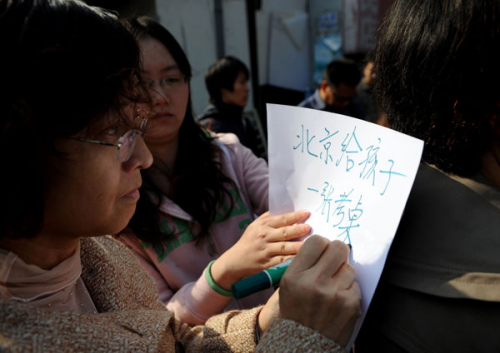
A mother asks for her child to have the right to take the national college entrance examination in Beijing. Parents of migrant children without Beijing hukou gather at the gate of the capital's education commission to check for updates of the gaokao rules
China needs more time to change the rules on where children can go to senior high school and take the national college entrance exam, academics say.
"Especially in large, developed cities and regions, the restrictions on children of migrant workers can't be relaxed in the short term unless authorities can solve the conflict between gigantic migrant populations and a scarcity of education resources," said Li Chang'an, a public policy professor at the University of International Business and Economics in Beijing.
Tan Songhua, who sits on the National Education Advisory Committee and is a key architect of the exam, known as the gaokao, agreed it will take time to strike a balance.
"Looking at the larger picture, the gaokao problem is not only about education but also public management," he said.
The opinions come after most provinces, municipalities and autonomous regions released detailed plans to reform gaokao rules for the children of migrant workers by the end of December.
Only Qinghai province and the Tibet autonomous region have not yet published their measures.
Those released by Beijing, Shanghai and Guangdong province were widely criticized as too strict.
Migrant children in Beijing still cannot take the entrance exam in 2013 and 2014 under the new gaokao rules. They are only allowed to attend secondary vocational schools from 2013 and higher vocational schools from 2014. After graduating from higher vocational schools, they can apply for universities.
Shanghai said it will allow nonresident children to enter senior high schools, vocational schools and take college entrance exams in 2014.
In Guangdong, such groups of children can be enrolled at senior high schools from this year and will be allowed to take the exams and compete with native residents on equal footing in 2016.
Migrant workers, whose children benefit by the new plans in the three regions, must meet requirements including having residential permits, and stable jobs and incomes, according to the plans.
"I feel very disappointed about the policy in Beijing. It is more than discrimination," said Shao Lingling, mother of a 13-year-old boy, from Henan province.

Copyright ©1999-2011 Chinanews.com. All rights reserved.
Reproduction in whole or in part without permission is prohibited.